
basiclingua-LLM-Based-NLP
LLM Based NLP Library.
Stars: 77
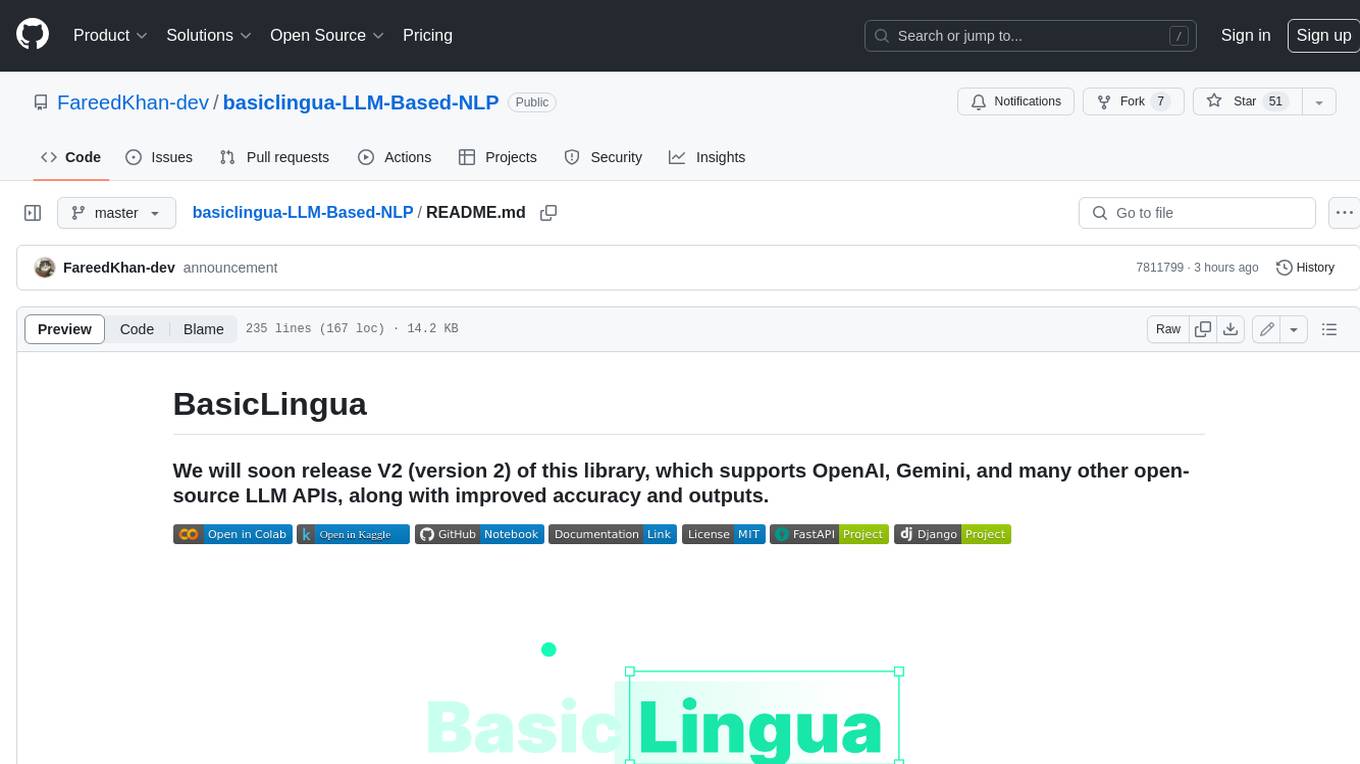
BasicLingua is a Python library that provides functionalities for linguistic tasks such as tokenization, stemming, lemmatization, and many others. It is based on the Gemini Language Model, which has demonstrated promising results in dealing with text data. BasicLingua can be used as an API or through a web demo. It is available under the MIT license and can be used in various projects.
README:
Created By: Fareed Khan
Basiclingua is a LLM based Python library that provides functionalities for linguistic tasks such as pattern extractions, intent recognition and many others, (Imagination is the limit).
- Why Building this Project?
- BasicLingua Architecture
- Evaluation Metrics
- AI Powered / Manual Documentation
- Tools and Technologies Used
- Updates
- Demo Video
- File Structure
- Installation / Update
- Initialization
- Supported LLMs
- Usage
- Features of the library
- Playground
- Acknowledgements
Natural Language Processing (NLP) has always been a challenging domain, requiring significant human effort and costs. Additionally, the data is becoming increasingly complex. By 2025, unstructured data, including vast amounts of text data, is expected to account for over 90% of the total data generated globally. Handling such data is expensive due to its ever-changing structure. However, recent advancements in AI, such as Large Language Models (LLMs), can process and understand text data more quickly and accurately than the human eye.
Our proposed solution, BasicLingua, is an NLP library in Python built on top of LLMs like LLaMA-3 and many others. It handles NLP tasks by processing only relevant text information, reducing costs, and providing efficient outputs similar to other text processing Python packages. BasicLingua is versatile and can be applied across various domains, from finance to healthcare, and any other field where text information is crucial. It offers endless possibilities and features, supported by AI-powered documentation. With the continuous growth of LLMs, such as LLaMA-3.1 and more recent powerful vision or text LLMs, the BasicLingua ecosystem has the potential to expand significantly.
One of the biggest challenges in building this architecture was ensuring the cost associated with using the features was minimal. To address this, we use effective prompt engineering techniques to optimize the performance of the models and reduce the cost of using the library.
Here is one of our spellcheck feature that uses OpenAI model to correct spelling mistakes in text, the backend engineering is shown below:
The spellcheck feature takes the user input and passes it to the selected model, which then corrects the spelling mistakes in the text but only returns the corrected words which are then replaced in the original text. This approach ensures that only the necessary corrections are made, reducing the cost of using the feature.
Our library has been tested on a wide range of text data, including clinical notes, documents, and general text.
| Dataset Category | Dataset Name | Description | Size | Source |
|---|---|---|---|---|
| Clinical Notes | MIMIC-IV | Medical Information Mart for Intensive Care | Random 3000 notes | MIMIC-IV |
| Documents | Wikipedia Articles | Wikipedia articles on various topics | Random 1000 articles | Wikipedia |
| General Text | AI generated text | Text generated by OpenAI and Gemini models | Random 5000 text samples | OpenAI, Gemini |
We evaluated the library for various linguistic tasks, benchmarking it against OpenAI, Gemini, and AnyScale models. The evaluation metrics used are as follows:
| Task Name | Evaluation Metric | OpenAI (GPT-3.5) | Gemini (Gemini-1.0) | AnyScale (Llama-3-70b) |
|---|---|---|---|---|
| Information Extraction | Average F1 Score | 0.85 | 0.64 | 0.77 |
| Analysis | Average Accuracy | 0.90 | 0.74 | 0.81 |
| Summarization | ROUGE Score | 0.78 | 0.68 | 0.72 |
| Coreference & Disambiguation | Average F1 Score | 0.89 | 0.73 | 0.84 |
| Pre-Processing | Average Accuracy | 0.88 | 0.73 | 0.82 |
The evaluation metrics show that the library performs well across different tasks, with OpenAI achieving the highest scores in most tasks. We evaluated the library for various linguistic tasks, benchmarking it against OpenAI, Gemini, and AnyScale models. The evaluation metrics used are as follows:
| Task Name | Evaluation Metric | OpenAI (GPT-3.5) | Gemini (Gemini-1.0) | AnyScale (Llama-3-70b) |
|---|---|---|---|---|
| Information Extraction | Average F1 Score | 0.85 | 0.64 | 0.77 |
| Analysis | Average Accuracy | 0.90 | 0.74 | 0.81 |
| Summarization | ROUGE Score | 0.78 | 0.68 | 0.72 |
| Coreference & Disambiguation | Average F1 Score | 0.89 | 0.73 | 0.84 |
| Pre-Processing | Average Accuracy | 0.88 | 0.73 | 0.82 |
The evaluation metrics show that the library performs well across different tasks, with OpenAI achieving the highest scores in most tasks. However, AnyScale's Llama-3-70b, an open-source model, demonstrates strong performance, closely matching the accuracy of other closed-source models. This is particularly noteworthy given its cost-effectiveness and accessibility. Additionally, it is anticipated that the upcoming Llama-3.1 will likely surpass the accuracy of the closed-source LLMs once it is integrated into version 3 of this library.
Given that our NLP library can handle a wide range of domain-related tasks, it is crucial to provide an AI-powered documentation for BasicLingua. This documentation allows developers to ask questions related to the library, and it responds promptly by offering the exact features they need, along with examples. Additionally, it can answer other common queries, such as how to get started with the library and much more.
Given that our NLP library is based on LLMs, it is crucial to provide an AI-powered documentation for BasicLingua. Makes the library more efficient to use and understand.
AI Documentation Webapp is available at -
You can also access the manual documentation within your code editor which contains parameters details, return types and examples of each function and more.
- Programming Language: Python
- Libraries: OpenAI, Google generative ai, AnyScale, Streamlit
- Deployment: Streamlit Sharing, PyPi
- Version Control: Git, GitHub
- Documentation: AI-Powered Documentation
- IDE: Jupyter Notebook, Visual Studio Code
-
2024/4/20We have released the second version of the library. The new version includes additional features and new LLMs for text and vision tasks. Our library now supportsOpenAI,Gemini, andAnyScalemodels for various linguistic tasks. We have also improved the performance of the library and added more functionalities to make it more versatile and user-friendly. -
2024/4/16We have added the AI-powered documentation for the library. The documentation is now available for use. We are currently working on improving the documentation and adding more features to the library. -
2024/3/3We have released the first version of the library. The library is now available for use. We are currently working on the documentation and the next version of the library. We are also working on the integration of the library with other LLMs. -
2024/1/10We have released the baby version of this library containing limited number of pre-processing features.
Project demo video showcasing some of the functionalities provided by the library.
The project files are organized as follows:
├── Demo
│ ├── demo_video.mp4 <-- Demo Video
├── Document <-- Containing the pdf of the project overview document
├── Tutorial
│ ├── Guide.ipynb <-- Jupyter Notebook for the library guide
├── backend-engineering
│ ├── OpenAI.py <-- OpenAI Backend Engineering
│ ├── Gemini.py <-- Gemini Backend Engineering
│ ├── AnyScale.py <-- AnyScale Backend Engineering (Open-Source LLMs)
├── images <-- Images used in the README
├── LICENSE <-- MIT License
├── README.md <-- Project READMEBefore installing BasicLingua, ensure that you have Python installed on your system. BasicLingua tested on Python 3.9 or greater. Earlier version may work but not guaranteed. To check your Python version, run the following command in your terminal:
python --versionIf you don't have Python installed or need to upgrade, visit the official Python website to download and install the latest version.
Once Python is set up, you can install BasicLingua using pip:
pip install basiclinguaor you can upgrade to the latest version using:
pip install --upgrade basiclinguaAfter installing BasicLingua, you need to import the models you want to use. You can choose to import specific models or all available models.
Import a Specific Model
# Importing OpenAI Model
from basiclingua import OpenAILingua
# Importing Google Gemini Model
from basiclingua import GeminiLingua
# Importing Anyscale Model
from basiclingua import AnyScaleLinguaImport All Models at Once
from basiclingua import OpenAILingua, GeminiLingua, AnyScaleLinguaOption 1 - Since this project is for AI Challenge 2024,you can contact us at [email protected] to get the API keys for OpenAI, Gemini and AnyScale for testing purposes.
Option 2 - You can create your own API keys from the respective platforms.
- Get your OpenAI API Key from OpenAI Platform
- Get your Gemini api key from Gemini Platform
- Get anyscale api key from AnyScale Platform
Before using any model, you must set the API key for that specific platform. This is a mandatory step. Each model class has a constructor that takes the API key and optional additional parameters, such as model names.
For Initializing OpenAI
# Initializing OpenAI Model
openai_model = OpenAILingua(
api_key="YOUR_OPENAI_API_KEY", # Your OpenAI API Key
model_name='gpt-3.5-turbo-0125', # Text Model Name
vision_model_name='gpt-4-turbo' # Vision Model Name
)Default models are gpt-3.5-turbo-0125 and gpt-4-turbo for text and vision respectively.
For Initializing Gemini
# Initializing Gemini Model
gemini_model = GeminiLingua(
api_key="YOUR_GEMINI_API_KEY", # Your Gemini API Key
model_name='gemini-1.0-pro-latest', # Text Model Name
vision_model_name='models/gemini-1.5-pro-latest' # Vision Model Name
)Default models are gemini-1.0-pro-latest and gemini-1.5-pro-latest for text and vision respectively.
For Initializing AnyScale (LLaMA-3, Mistral etc)
# Initializing AnyScale Model
anyscale_model = AnyScaleLingua(
api_key="YOUR_ANY_SCALE_API_KEY", # Your AnyScale API Key
model_name="meta-llama/Llama-3-70b-chat-hf" # Text Model Name
)Default model is meta-llama/Llama-3-70b-chat-hf.
For OpenAILingua, all text and vision models are supported as available on the OpenAI Platform.
For GeminiLingua, all text and vision models are supported as available on the Gemini Platform.
A complete list of open-source supported models under AnyScaleLingua is available on the AnyScale Platform.
Default models are:
| Source | Text Model | Vision Model | Embedding Model |
|---|---|---|---|
| OpenAI | gpt-3.5-turbo-0125 |
gpt-4-turbo |
text-embedding-3-large |
| Gemini | gemini-1.0-pro-latest |
gemini-1.5-pro-latest |
models/embedding-001 |
| AnyScale | meta-llama/Llama-3-70b-chat-hf |
meta-llama/Llama-3-70b-chat-hf |
thenlper/gte-large |
The library provides a wide range of functionalities for linguistic tasks some of which are mentioned below. You can use our AI-powered documentation to learn more about the functionalities provided by the library.
Entity extraction is crucial for transforming unstructured text into structured data, enabling efficient analysis and automation in fields like finance, healthcare, and cybersecurity. However, it can be challenging due to the complexity and ambiguity of language, which often requires intricate regex or NLP techniques.
Regex-based entity extraction is time-consuming due to its detailed pattern definitions, but with our approach, you only need to define the pattern name to extract entities with minimal effort. Here's an example of extracting ICD (International Classification of Diseases) codes:
# ClinicalNote with complex structure and formatting
user_input = """Patient John, last name: Doe; 45 yrs
Symptoms: fatigue + frequent urination (possible diabetes); dizziness
Diagnosis - Type 2 Diabetes (E11.9), Hypertension (I10)
Prescribed: Metformin @ 500mg/day; Amlodipine, twice a day
Allergic: PCN (penicillin)
Family history of diabetes and HBP (high blood pressure)
Additional notes: testing for cholesterol and kidney function
Patient was advised to monitor blood sugar levels regularly.
Mentioned: Father - Type 2 Diabetes; Mother - Hypertension
Description - T2 Diabetes without complications; Essential Hypertension."""
# Define the patterns to extract
patterns = "ICD-10 Codes, Diseases, Medications, Allergies, Symptoms, Family History, Descriptions"
# Using OpenAI to extract entities
openai_entities = anyscale_model.extract_patterns(user_input, patterns=patterns)
# Displaying the extracted entities
print(openai_entities)
######## Output ########
{
"ICD-10 Codes": ["E11.9", "I10"],
"Diseases": ["Type 2 Diabetes", "Hypertension"],
"Medications": ["Metformin", "Amlodipine"],
"Allergies": ["Penicillin"],
"Symptoms": ["fatigue", "frequent urination", "dizziness"],
"Family History": ["Father with Type 2 Diabetes", "Mother with Hypertension"],
"Descriptions": [
"Type 2 Diabetes without complications",
"Essential (primary) hypertension",
"testing for cholesterol and kidney function"
]
}
######## Output ########Similarly, Text coreference is difficult because it involves figuring out which words refer to the same person or thing in a sentence or a text. It requires a deep understanding of context and the way language is used to connect different parts of a text.
Here's an example of how BasicLingua can help you resolve coreferences in a text:
# User input with complex co-references
user_input = """
Jane and her colleague Tom were preparing for the upcoming meeting with the new clients. She had worked on the presentation slides, while he focused on the data analysis.
When the day of the meeting arrived, Jane noticed that the projector was not working properly, so she asked Tom to check it out.
He found that it needed a new cable, but they had none in the office. They had to improvise with a laptop. During the presentation, Jane felt nervous because the setup wasn't ideal, but Tom reassured her that everything would be fine.
The clients appreciated their efforts, and both Jane and Tom were relieved when the meeting concluded successfully. As they left, Jane told Tom that she was grateful for his support.
"""
# Using AnyScale model to resolve coreferences
anyscale_coref = anyscale_model.text_coreference(user_input)
# Displaying the resolved coreferences
print("AnyScale Coreference:", anyscale_coref)
######## Output ########
{
"she": "Jane",
"he": "Tom",
"they": ["Jane", "Tom"],
"her": "Jane",
"him": "Tom"
}
######## Output ########There are many other functionalities provided by the library that can help you with various linguistic tasks. You can refer to our AI-powered documentation that can help you understand the functionalities of the library and how to use them effectively.
There are more than 20 functionalities provided by the library. But due to their effectiveness across different domains, we have created an AI-powered documentation to help you understand the functionalities in a more broadened way.
| Function Name | Python Function Name | Parameters | Returns |
|---|---|---|---|
| Extract Patterns | extract_patterns |
user_input, patterns
|
A JSON of extracted patterns from the input sentence |
| Detect NER | detect_ner |
user_input, ner_tags
|
A JSON of detected Named Entity Recognition (NER) entities |
| Text Intent | text_intent |
user_input |
A list of identified intents from the input sentence |
| . . . | . . . | . . . | . . . |
You can explore more by chatting with our Documentation Chatbot to get a better understanding of the functionalities provided by the library.
Since this library is available under the MIT license, you can use it in your projects. All the backend code is available in the backend-engineering folder.
- Rohan Anil et al., "Gemini: A Family of Highly Capable Multimodal Models", arXiv, April 2024. DOI: 10.48550/arXiv.2312.11805
- OpenAI Team. (2024). OpenAI GPT-3.5: The Next Evolution of Language Models. OpenAI Blog. https://openai.com/blog/gpt-3-5
- Meta AI. (2024, April 18). Introducing Meta Llama 3: The most capable openly available LLM to date. Meta AI Blog, from https://ai.meta.com/blog/meta-llama-3
- Ye, Q., Axmed, M., Pryzant, R., & Khani, F. (2024). Prompt engineering a prompt engineer. arXiv. https://doi.org/10.48550/arXiv.2311.05661
For Tasks:
Click tags to check more tools for each tasksFor Jobs:
Alternative AI tools for basiclingua-LLM-Based-NLP
Similar Open Source Tools

basiclingua-LLM-Based-NLP
BasicLingua is a Python library that provides functionalities for linguistic tasks such as tokenization, stemming, lemmatization, and many others. It is based on the Gemini Language Model, which has demonstrated promising results in dealing with text data. BasicLingua can be used as an API or through a web demo. It is available under the MIT license and can be used in various projects.
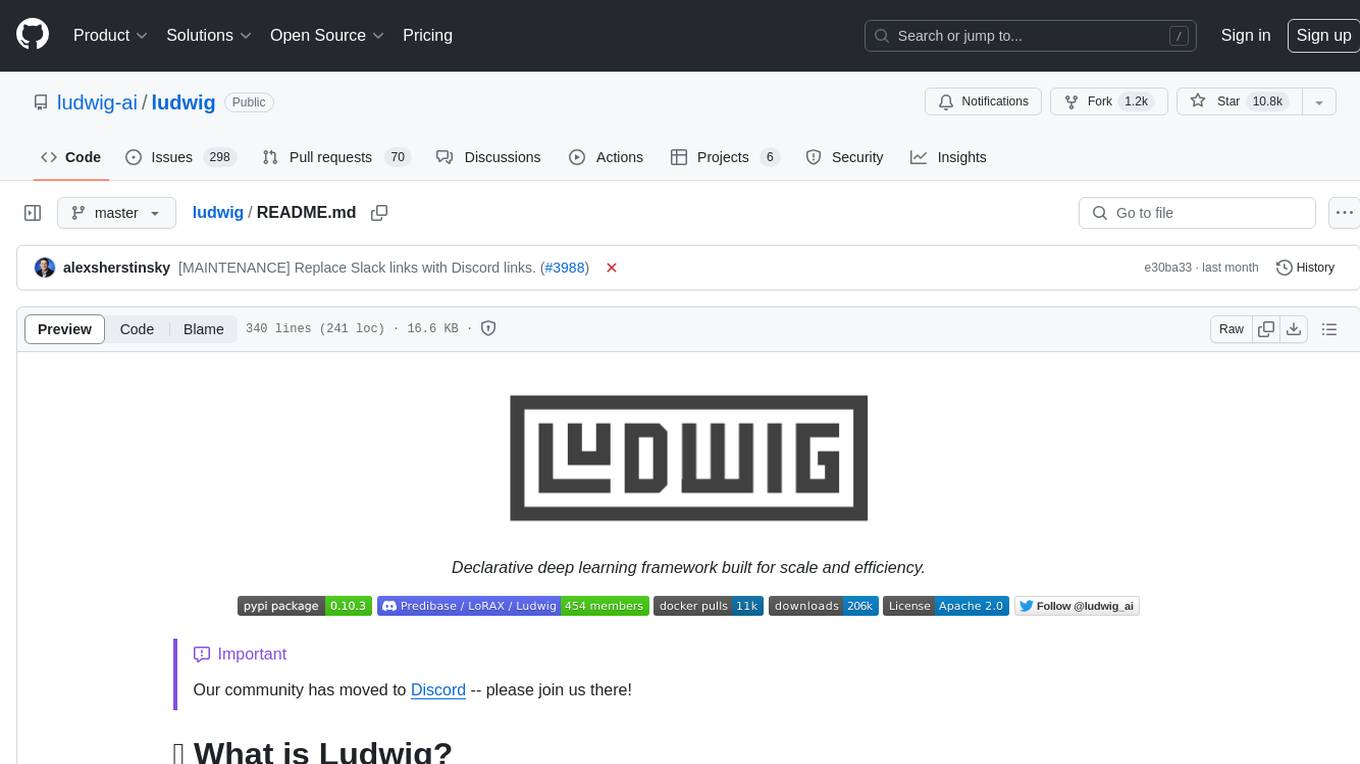
ludwig
Ludwig is a declarative deep learning framework designed for scale and efficiency. It is a low-code framework that allows users to build custom AI models like LLMs and other deep neural networks with ease. Ludwig offers features such as optimized scale and efficiency, expert level control, modularity, and extensibility. It is engineered for production with prebuilt Docker containers, support for running with Ray on Kubernetes, and the ability to export models to Torchscript and Triton. Ludwig is hosted by the Linux Foundation AI & Data.
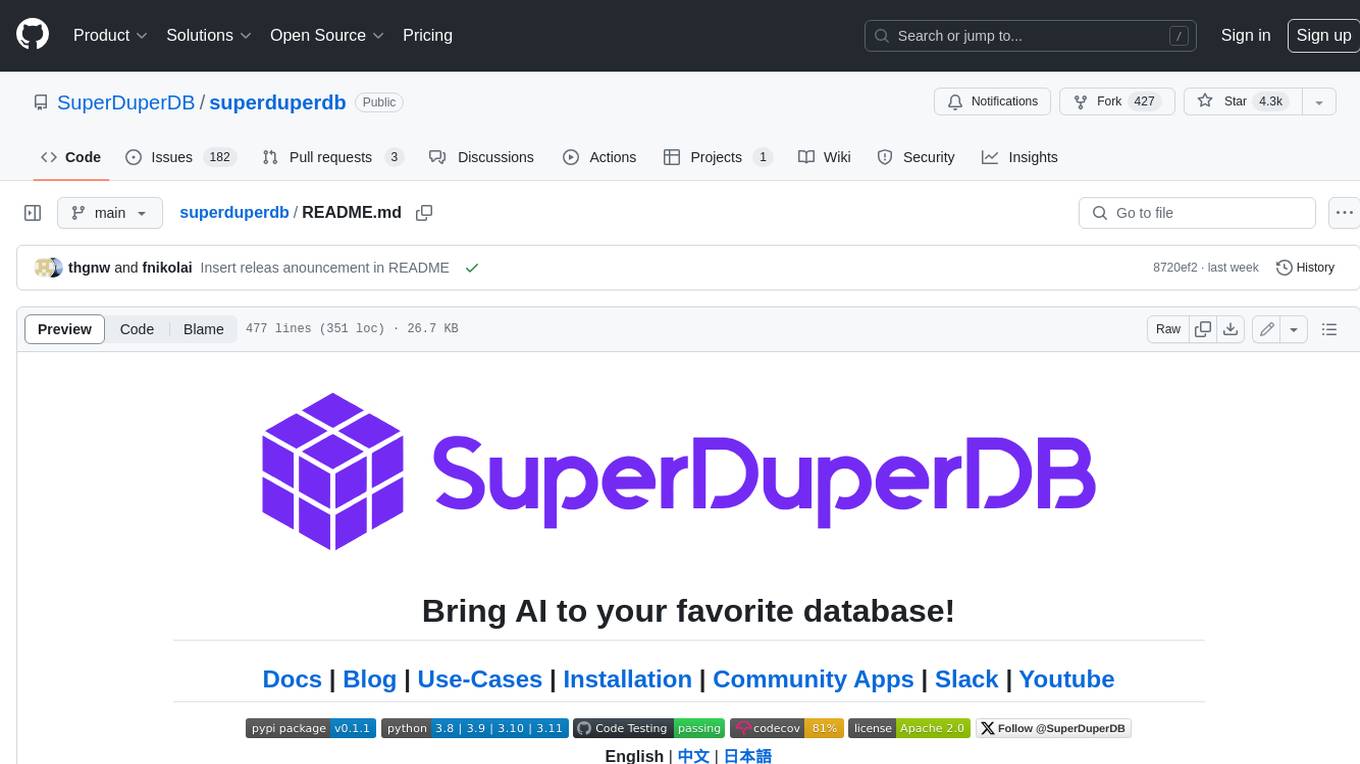
superduperdb
SuperDuperDB is a Python framework for integrating AI models, APIs, and vector search engines directly with your existing databases, including hosting of your own models, streaming inference and scalable model training/fine-tuning. Build, deploy and manage any AI application without the need for complex pipelines, infrastructure as well as specialized vector databases, and moving our data there, by integrating AI at your data's source: - Generative AI, LLMs, RAG, vector search - Standard machine learning use-cases (classification, segmentation, regression, forecasting recommendation etc.) - Custom AI use-cases involving specialized models - Even the most complex applications/workflows in which different models work together SuperDuperDB is **not** a database. Think `db = superduper(db)`: SuperDuperDB transforms your databases into an intelligent platform that allows you to leverage the full AI and Python ecosystem. A single development and deployment environment for all your AI applications in one place, fully scalable and easy to manage.
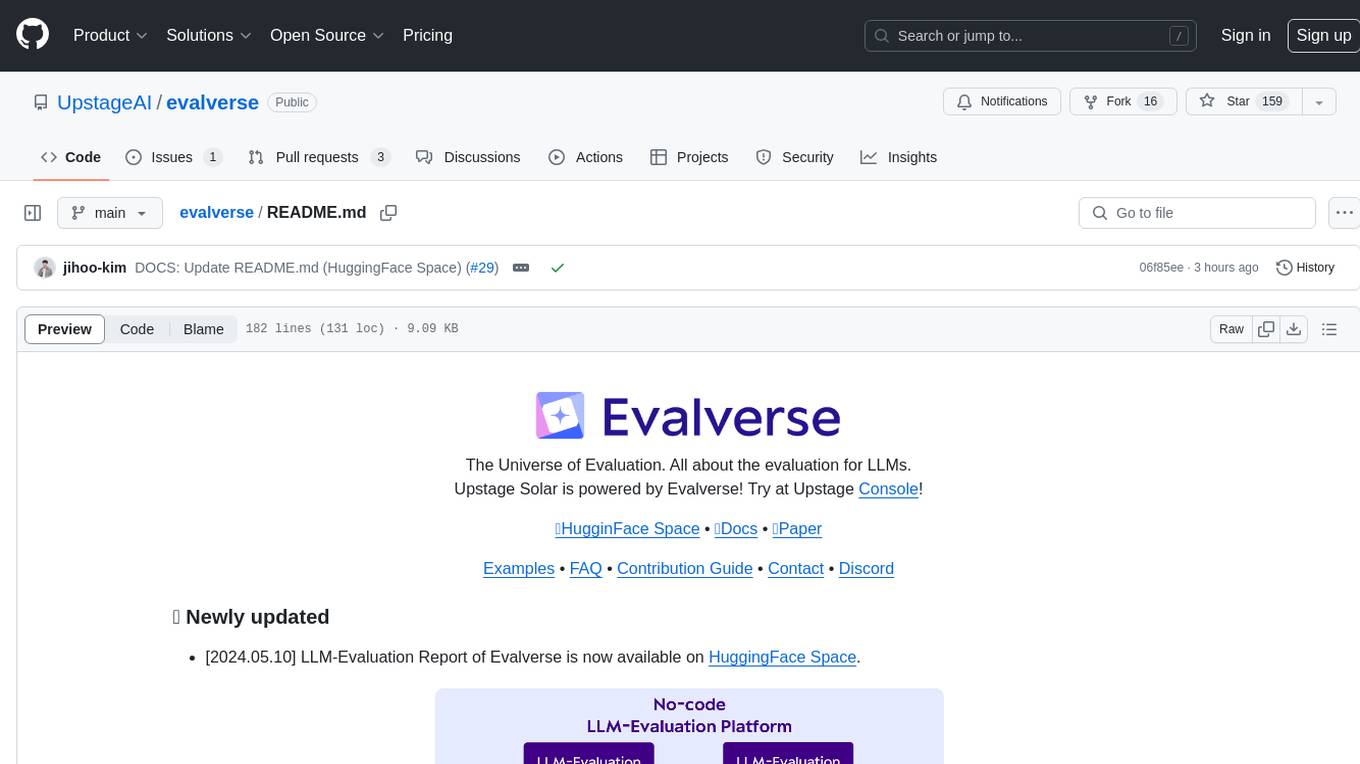
evalverse
Evalverse is an open-source project designed to support Large Language Model (LLM) evaluation needs. It provides a standardized and user-friendly solution for processing and managing LLM evaluations, catering to AI research engineers and scientists. Evalverse supports various evaluation methods, insightful reports, and no-code evaluation processes. Users can access unified evaluation with submodules, request evaluations without code via Slack bot, and obtain comprehensive reports with scores, rankings, and visuals. The tool allows for easy comparison of scores across different models and swift addition of new evaluation tools.
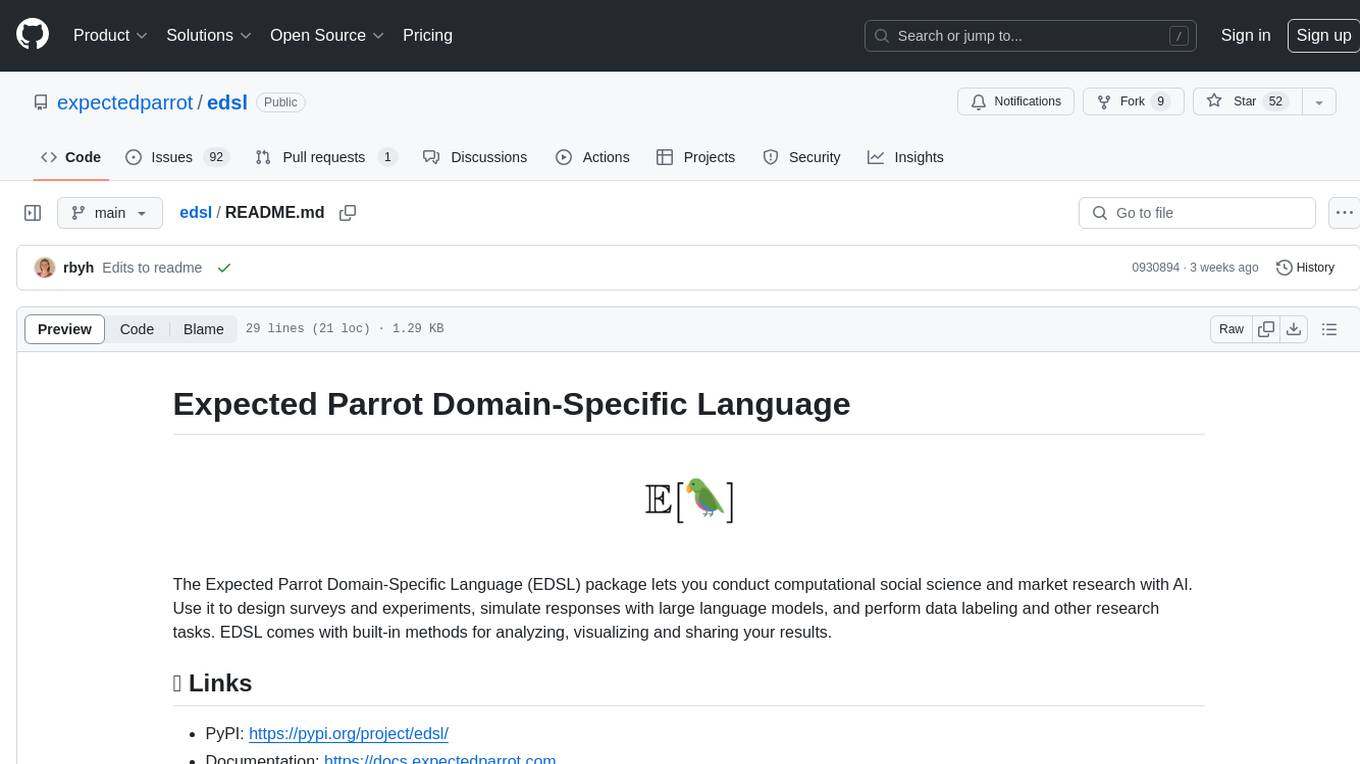
edsl
The Expected Parrot Domain-Specific Language (EDSL) package enables users to conduct computational social science and market research with AI. It facilitates designing surveys and experiments, simulating responses using large language models, and performing data labeling and other research tasks. EDSL includes built-in methods for analyzing, visualizing, and sharing research results. It is compatible with Python 3.9 - 3.11 and requires API keys for LLMs stored in a `.env` file.
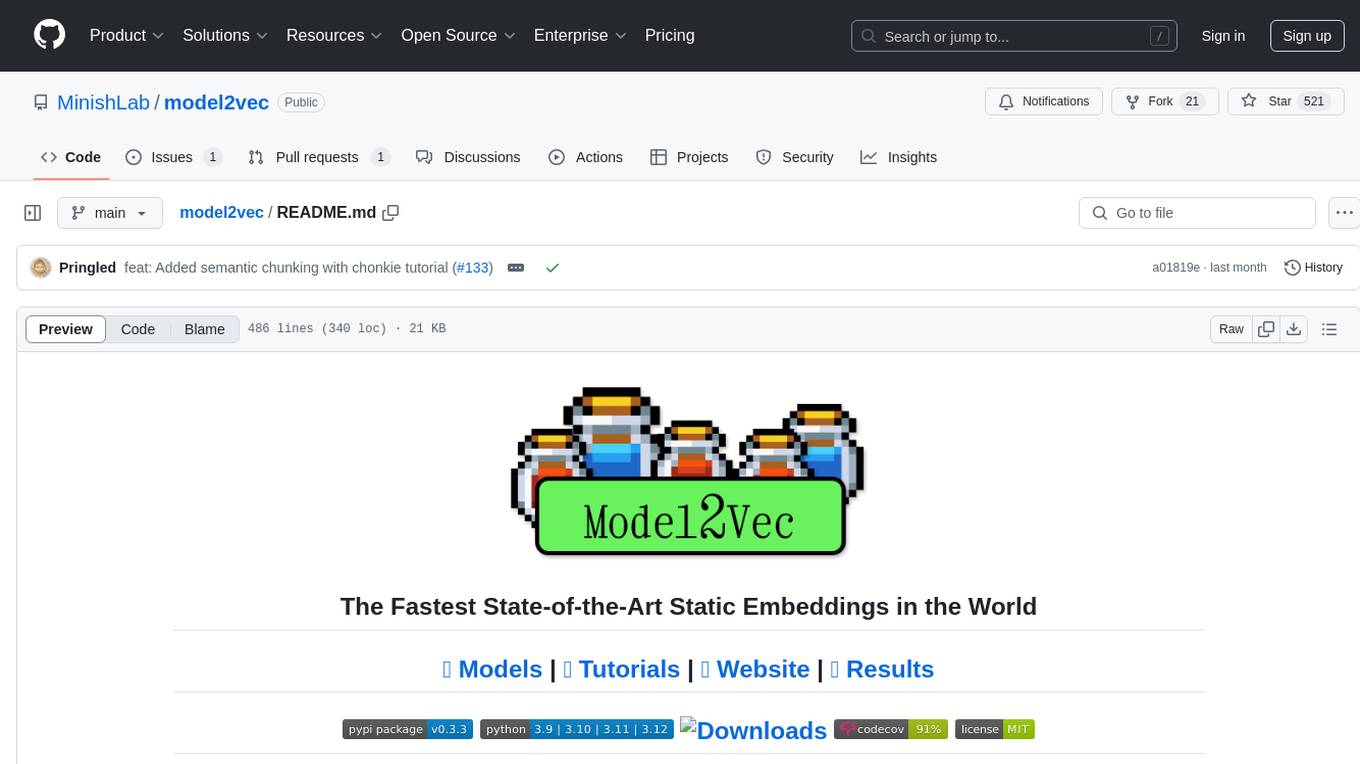
model2vec
Model2Vec is a technique to turn any sentence transformer into a really small static model, reducing model size by 15x and making the models up to 500x faster, with a small drop in performance. It outperforms other static embedding models like GLoVe and BPEmb, is lightweight with only `numpy` as a major dependency, offers fast inference, dataset-free distillation, and is integrated into Sentence Transformers, txtai, and Chonkie. Model2Vec creates powerful models by passing a vocabulary through a sentence transformer model, reducing dimensionality using PCA, and weighting embeddings using zipf weighting. Users can distill their own models or use pre-trained models from the HuggingFace hub. Evaluation can be done using the provided evaluation package. Model2Vec is licensed under MIT.
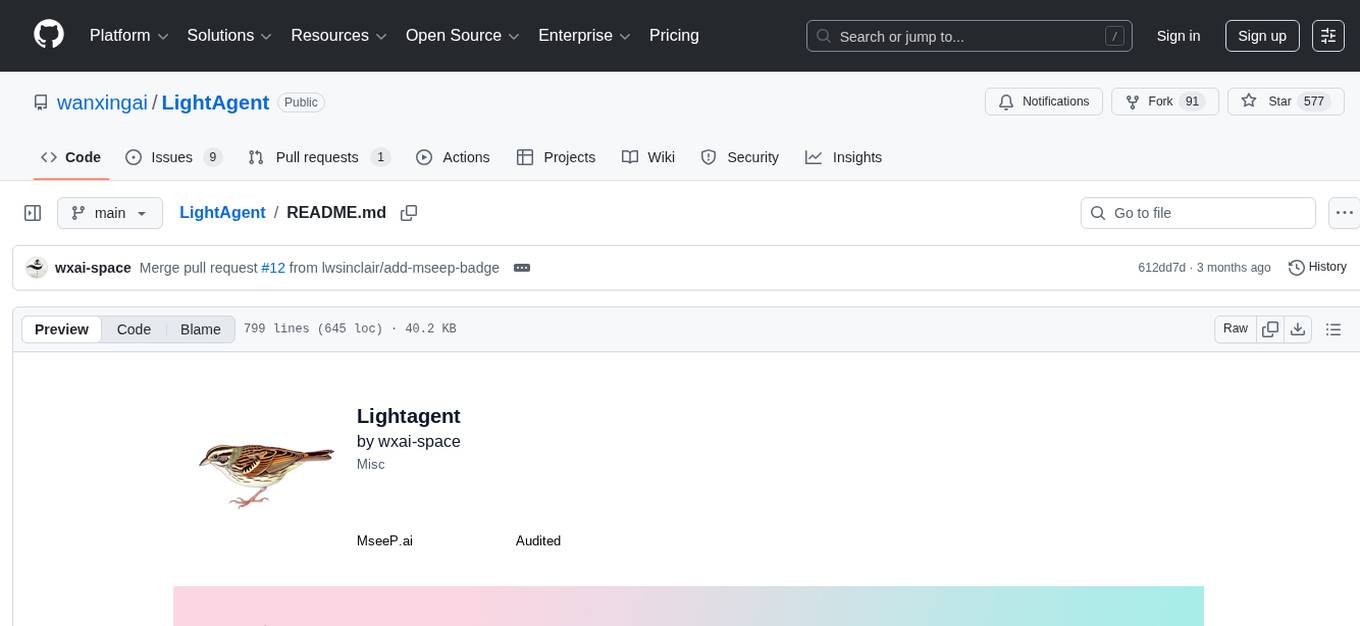
LightAgent
LightAgent is a lightweight, open-source active Agentic AI development framework with memory, tools, and a tree of thought. It supports multi-agent collaboration, autonomous learning, tool integration, complex goals, and multi-model support. It enables simpler self-learning agents, seamless integration with major chat frameworks, and quick tool generation. LightAgent also supports memory modules, tool integration, tree of thought planning, multi-agent collaboration, streaming API, agent self-learning, Langfuse log tracking, and agent assessment. It is compatible with various large models and offers features like intelligent customer service, data analysis, automated tools, and educational assistance.
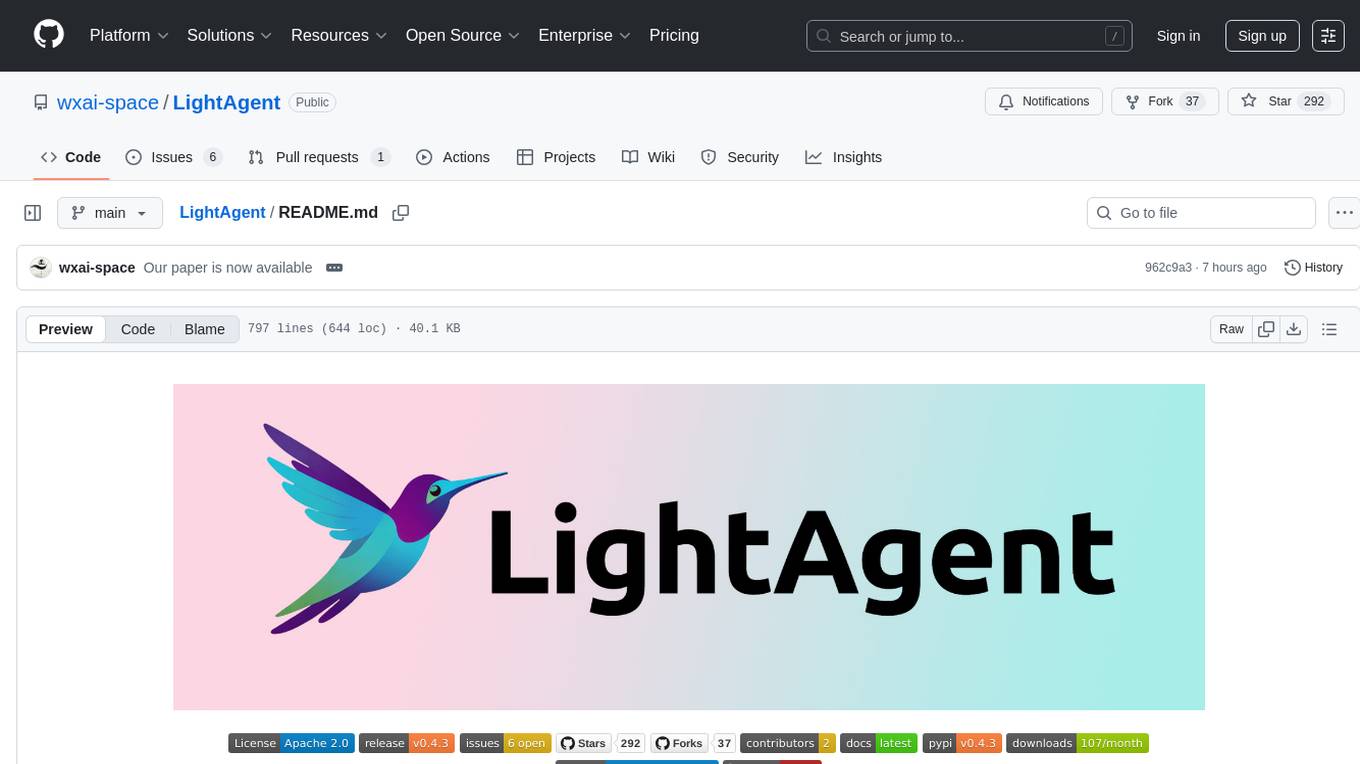
LightAgent
LightAgent is a lightweight, open-source Agentic AI development framework with memory, tools, and a tree of thought. It supports multi-agent collaboration, autonomous learning, tool integration, complex task handling, and multi-model support. It also features a streaming API, tool generator, agent self-learning, adaptive tool mechanism, and more. LightAgent is designed for intelligent customer service, data analysis, automated tools, and educational assistance.
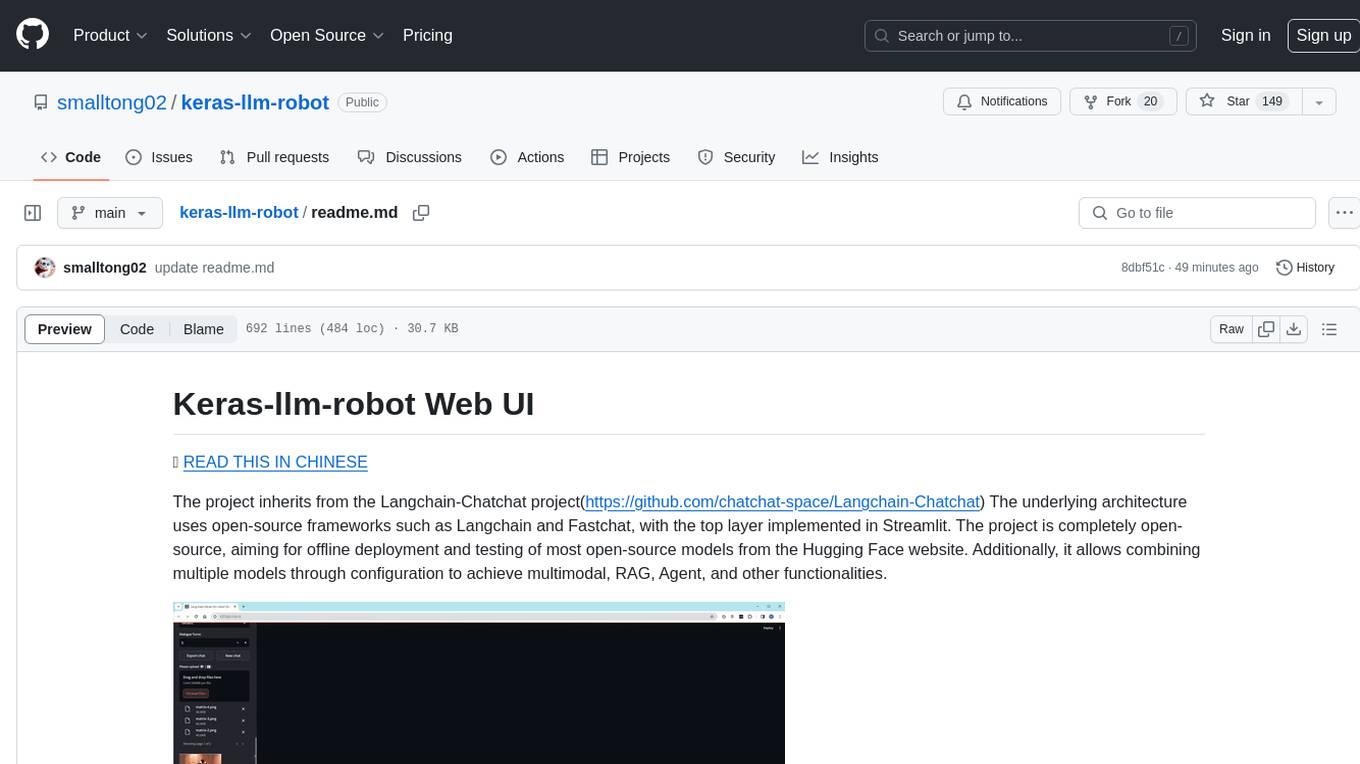
keras-llm-robot
The Keras-llm-robot Web UI project is an open-source tool designed for offline deployment and testing of various open-source models from the Hugging Face website. It allows users to combine multiple models through configuration to achieve functionalities like multimodal, RAG, Agent, and more. The project consists of three main interfaces: chat interface for language models, configuration interface for loading models, and tools & agent interface for auxiliary models. Users can interact with the language model through text, voice, and image inputs, and the tool supports features like model loading, quantization, fine-tuning, role-playing, code interpretation, speech recognition, image recognition, network search engine, and function calling.
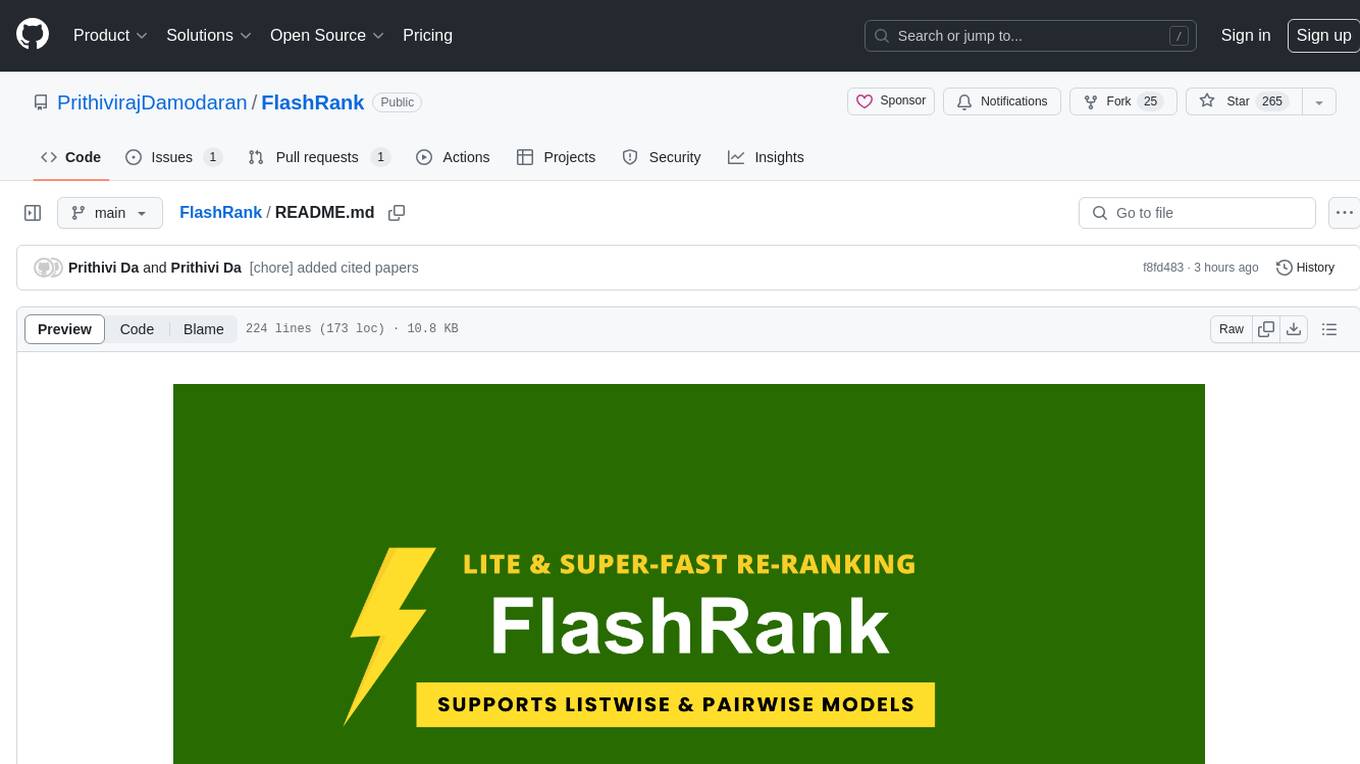
FlashRank
FlashRank is an ultra-lite and super-fast Python library designed to add re-ranking capabilities to existing search and retrieval pipelines. It is based on state-of-the-art Language Models (LLMs) and cross-encoders, offering support for pairwise/pointwise rerankers and listwise LLM-based rerankers. The library boasts the tiniest reranking model in the world (~4MB) and runs on CPU without the need for Torch or Transformers. FlashRank is cost-conscious, with a focus on low cost per invocation and smaller package size for efficient serverless deployments. It supports various models like ms-marco-TinyBERT, ms-marco-MiniLM, rank-T5-flan, ms-marco-MultiBERT, and more, with plans for future model additions. The tool is ideal for enhancing search precision and speed in scenarios where lightweight models with competitive performance are preferred.
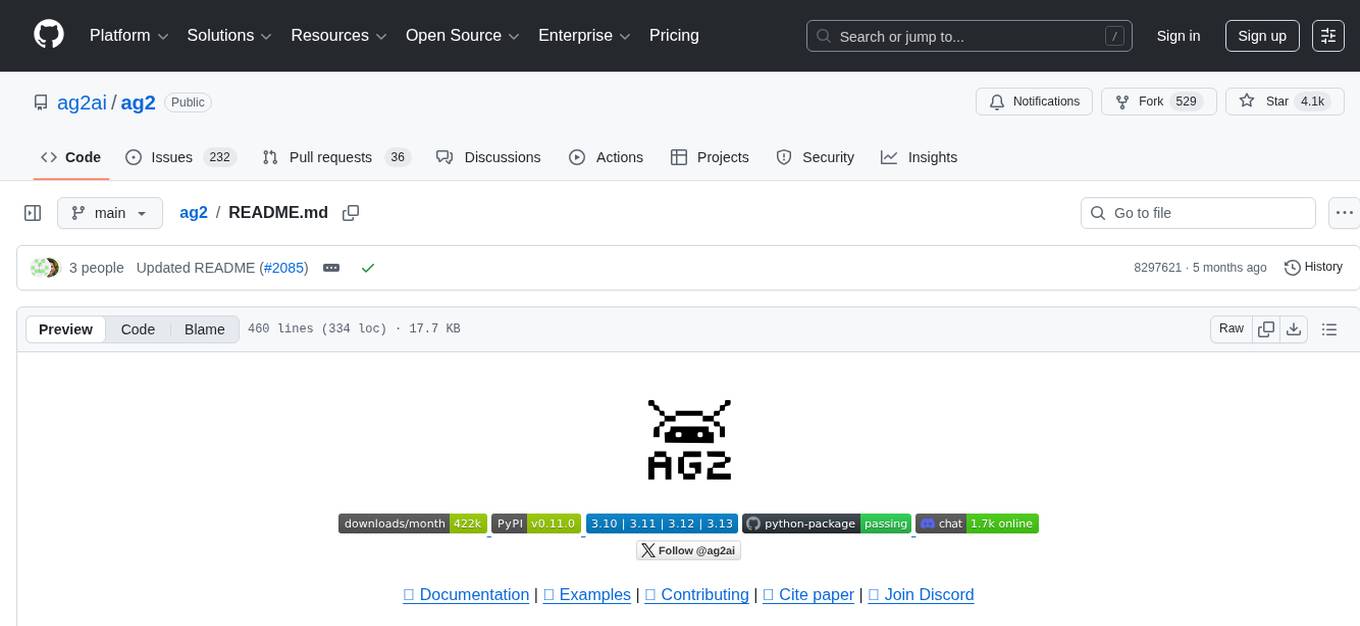
ag2
Ag2 is a lightweight and efficient tool for generating automated reports from data sources. It simplifies the process of creating reports by allowing users to define templates and automate the data extraction and formatting. With Ag2, users can easily generate reports in various formats such as PDF, Excel, and CSV, saving time and effort in manual report generation tasks.
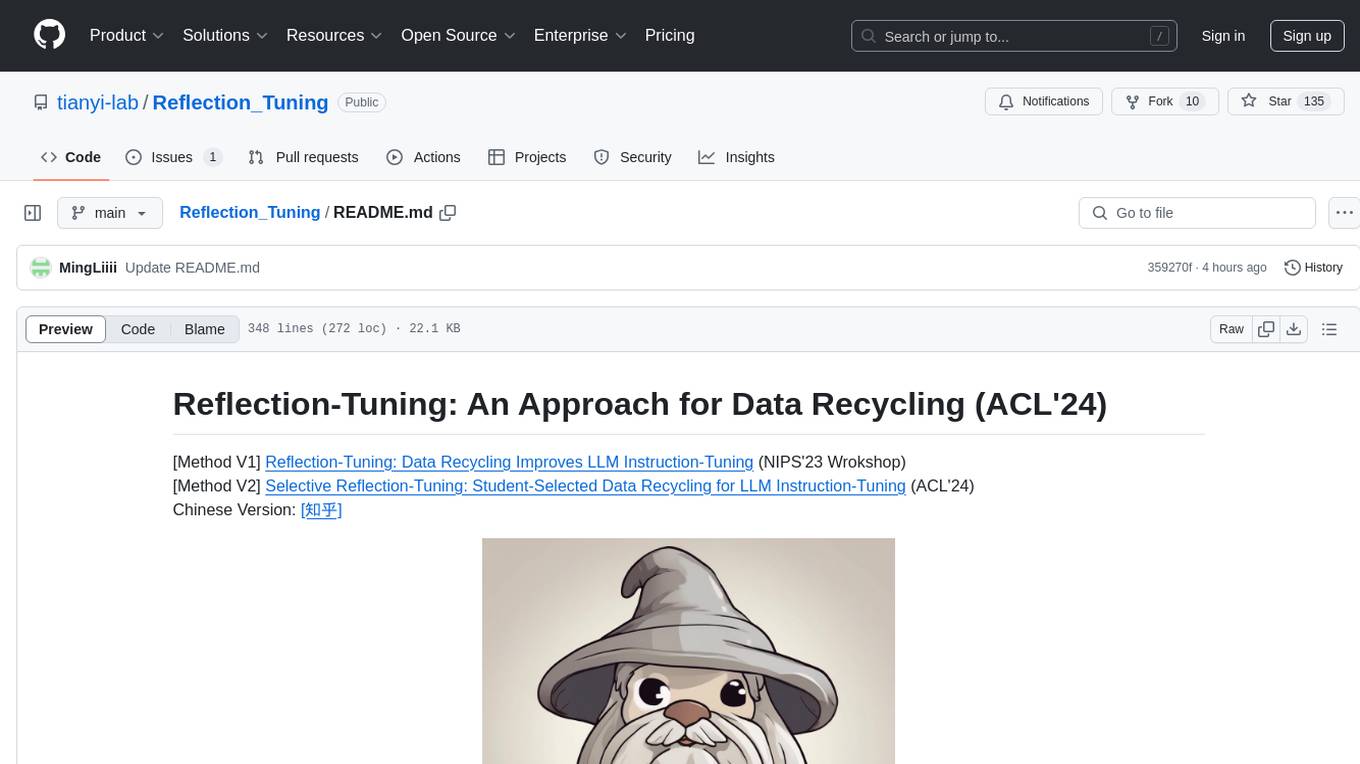
Reflection_Tuning
Reflection-Tuning is a project focused on improving the quality of instruction-tuning data through a reflection-based method. It introduces Selective Reflection-Tuning, where the student model can decide whether to accept the improvements made by the teacher model. The project aims to generate high-quality instruction-response pairs by defining specific criteria for the oracle model to follow and respond to. It also evaluates the efficacy and relevance of instruction-response pairs using the r-IFD metric. The project provides code for reflection and selection processes, along with data and model weights for both V1 and V2 methods.
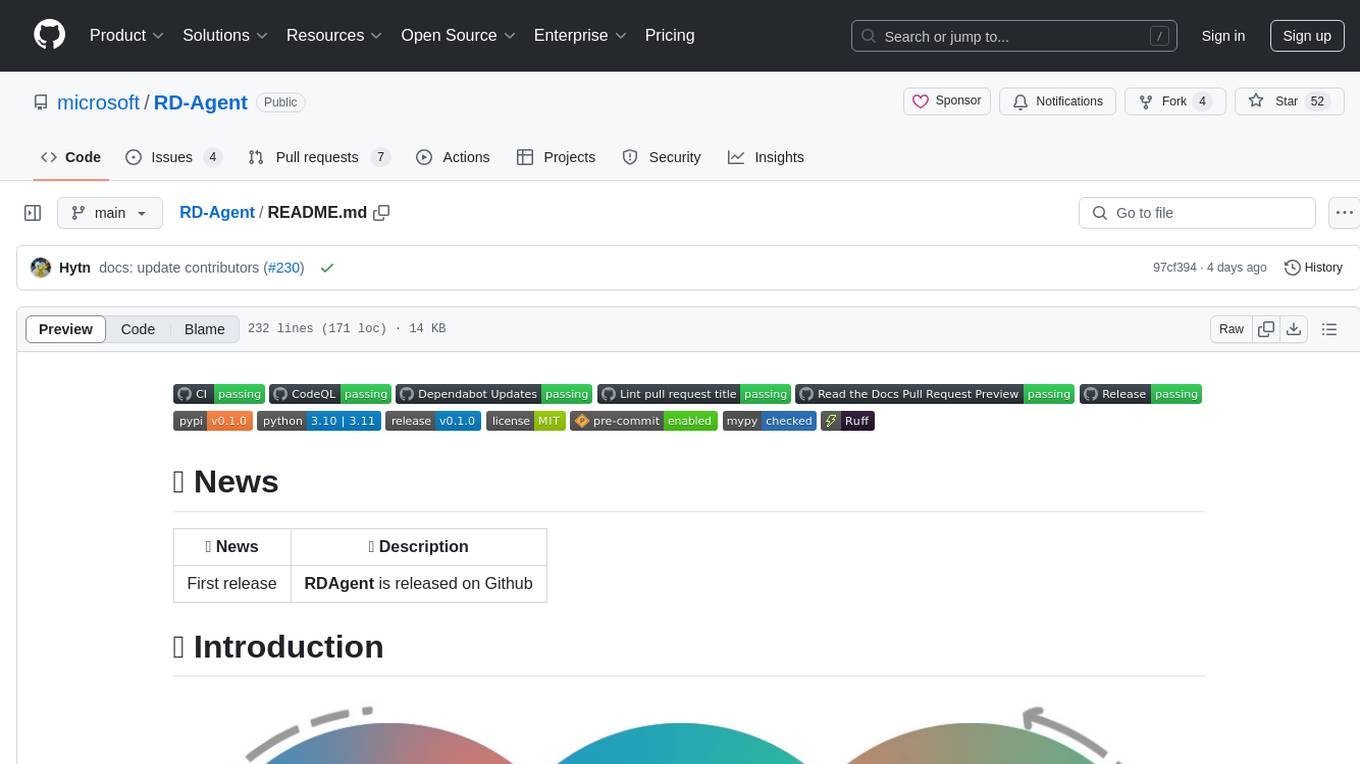
RD-Agent
RD-Agent is a tool designed to automate critical aspects of industrial R&D processes, focusing on data-driven scenarios to streamline model and data development. It aims to propose new ideas ('R') and implement them ('D') automatically, leading to solutions of significant industrial value. The tool supports scenarios like Automated Quantitative Trading, Data Mining Agent, Research Copilot, and more, with a framework to push the boundaries of research in data science. Users can create a Conda environment, install the RDAgent package from PyPI, configure GPT model, and run various applications for tasks like quantitative trading, model evolution, medical prediction, and more. The tool is intended to enhance R&D processes and boost productivity in industrial settings.
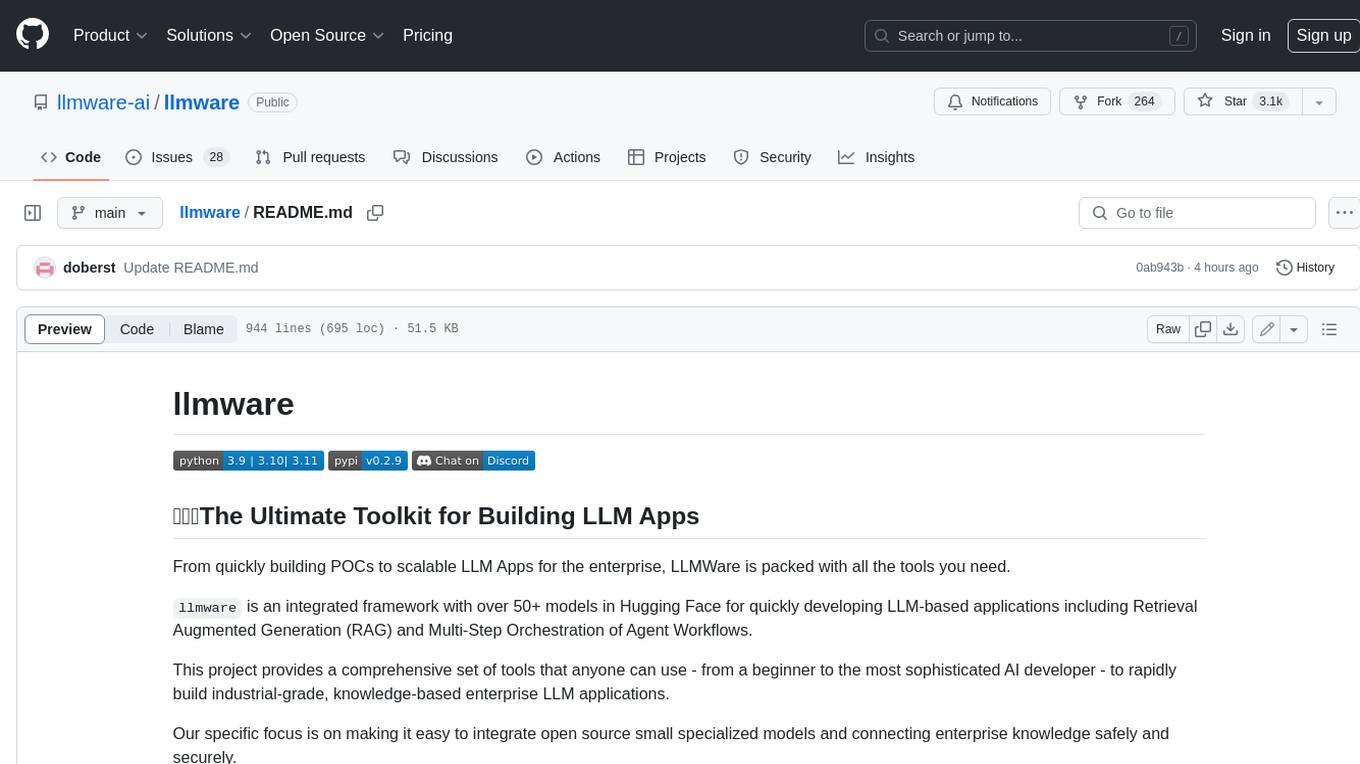
llmware
LLMWare is a framework for quickly developing LLM-based applications including Retrieval Augmented Generation (RAG) and Multi-Step Orchestration of Agent Workflows. This project provides a comprehensive set of tools that anyone can use - from a beginner to the most sophisticated AI developer - to rapidly build industrial-grade, knowledge-based enterprise LLM applications. Our specific focus is on making it easy to integrate open source small specialized models and connecting enterprise knowledge safely and securely.
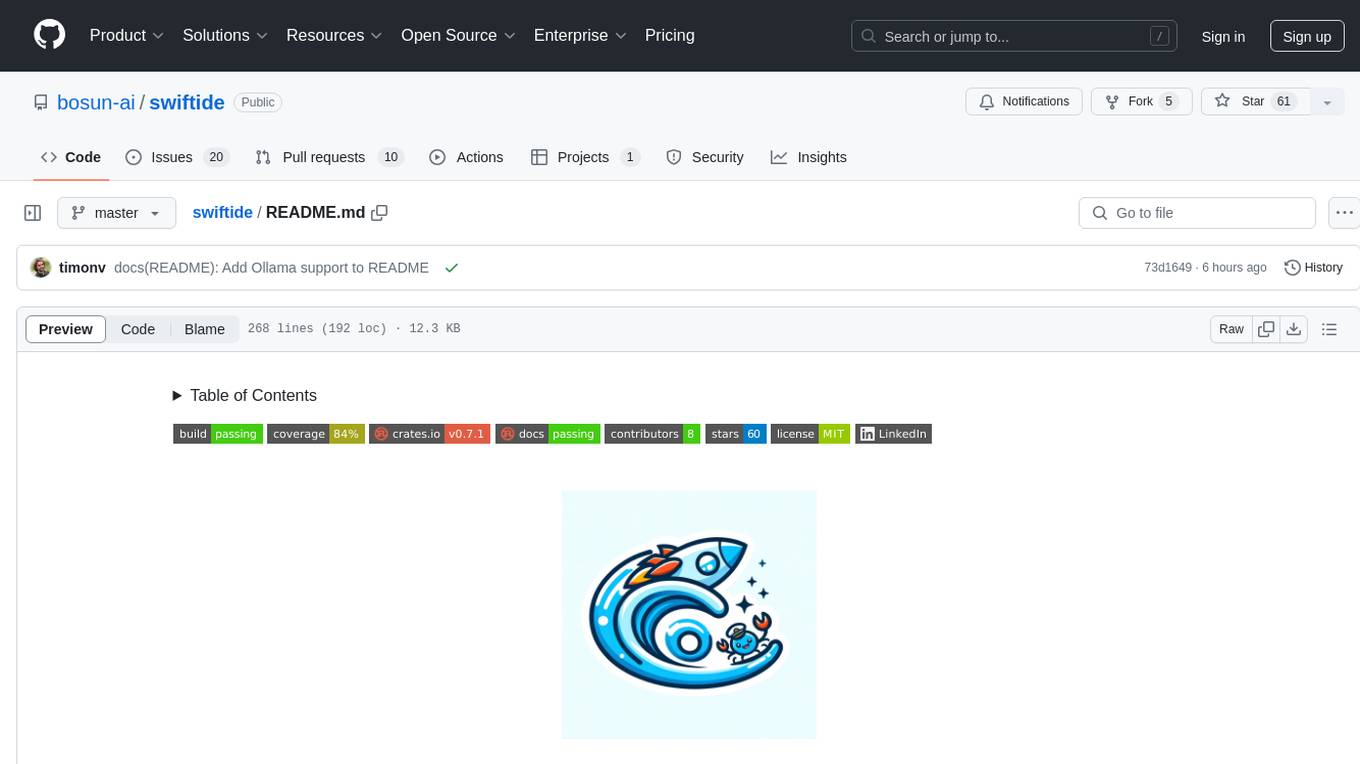
swiftide
Swiftide is a fast, streaming indexing and query library tailored for Retrieval Augmented Generation (RAG) in AI applications. It is built in Rust, utilizing parallel, asynchronous streams for blazingly fast performance. With Swiftide, users can easily build AI applications from idea to production in just a few lines of code. The tool addresses frustrations around performance, stability, and ease of use encountered while working with Python-based tooling. It offers features like fast streaming indexing pipeline, experimental query pipeline, integrations with various platforms, loaders, transformers, chunkers, embedders, and more. Swiftide aims to provide a platform for data indexing and querying to advance the development of automated Large Language Model (LLM) applications.
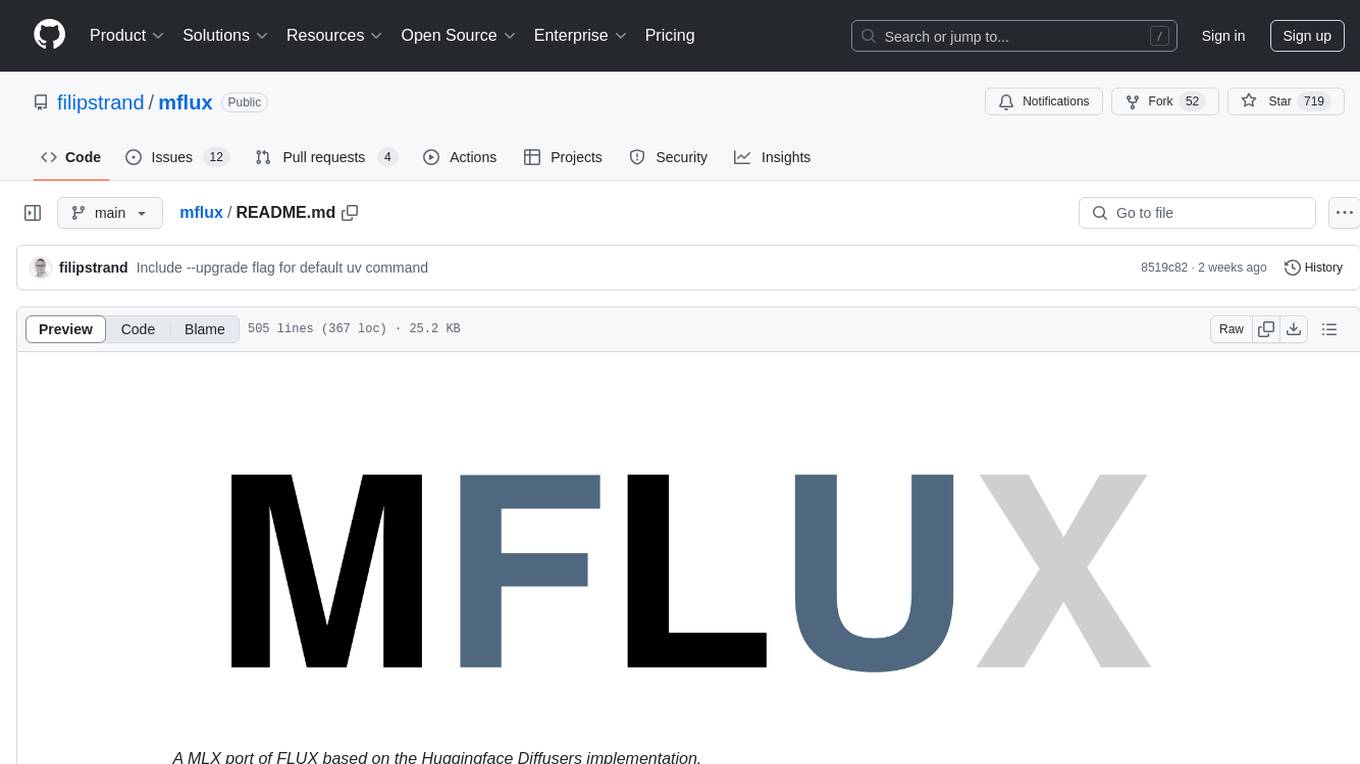
mflux
MFLUX is a line-by-line port of the FLUX implementation in the Huggingface Diffusers library to Apple MLX. It aims to run powerful FLUX models from Black Forest Labs locally on Mac machines. The codebase is minimal and explicit, prioritizing readability over generality and performance. Models are implemented from scratch in MLX, with tokenizers from the Huggingface Transformers library. Dependencies include Numpy and Pillow for image post-processing. Installation can be done using `uv tool` or classic virtual environment setup. Command-line arguments allow for image generation with specified models, prompts, and optional parameters. Quantization options for speed and memory reduction are available. LoRA adapters can be loaded for fine-tuning image generation. Controlnet support provides more control over image generation with reference images. Current limitations include generating images one by one, lack of support for negative prompts, and some LoRA adapters not working.
For similar tasks

basiclingua-LLM-Based-NLP
BasicLingua is a Python library that provides functionalities for linguistic tasks such as tokenization, stemming, lemmatization, and many others. It is based on the Gemini Language Model, which has demonstrated promising results in dealing with text data. BasicLingua can be used as an API or through a web demo. It is available under the MIT license and can be used in various projects.
For similar jobs

weave
Weave is a toolkit for developing Generative AI applications, built by Weights & Biases. With Weave, you can log and debug language model inputs, outputs, and traces; build rigorous, apples-to-apples evaluations for language model use cases; and organize all the information generated across the LLM workflow, from experimentation to evaluations to production. Weave aims to bring rigor, best-practices, and composability to the inherently experimental process of developing Generative AI software, without introducing cognitive overhead.

agentcloud
AgentCloud is an open-source platform that enables companies to build and deploy private LLM chat apps, empowering teams to securely interact with their data. It comprises three main components: Agent Backend, Webapp, and Vector Proxy. To run this project locally, clone the repository, install Docker, and start the services. The project is licensed under the GNU Affero General Public License, version 3 only. Contributions and feedback are welcome from the community.

oss-fuzz-gen
This framework generates fuzz targets for real-world `C`/`C++` projects with various Large Language Models (LLM) and benchmarks them via the `OSS-Fuzz` platform. It manages to successfully leverage LLMs to generate valid fuzz targets (which generate non-zero coverage increase) for 160 C/C++ projects. The maximum line coverage increase is 29% from the existing human-written targets.

LLMStack
LLMStack is a no-code platform for building generative AI agents, workflows, and chatbots. It allows users to connect their own data, internal tools, and GPT-powered models without any coding experience. LLMStack can be deployed to the cloud or on-premise and can be accessed via HTTP API or triggered from Slack or Discord.

VisionCraft
The VisionCraft API is a free API for using over 100 different AI models. From images to sound.

kaito
Kaito is an operator that automates the AI/ML inference model deployment in a Kubernetes cluster. It manages large model files using container images, avoids tuning deployment parameters to fit GPU hardware by providing preset configurations, auto-provisions GPU nodes based on model requirements, and hosts large model images in the public Microsoft Container Registry (MCR) if the license allows. Using Kaito, the workflow of onboarding large AI inference models in Kubernetes is largely simplified.

PyRIT
PyRIT is an open access automation framework designed to empower security professionals and ML engineers to red team foundation models and their applications. It automates AI Red Teaming tasks to allow operators to focus on more complicated and time-consuming tasks and can also identify security harms such as misuse (e.g., malware generation, jailbreaking), and privacy harms (e.g., identity theft). The goal is to allow researchers to have a baseline of how well their model and entire inference pipeline is doing against different harm categories and to be able to compare that baseline to future iterations of their model. This allows them to have empirical data on how well their model is doing today, and detect any degradation of performance based on future improvements.

Azure-Analytics-and-AI-Engagement
The Azure-Analytics-and-AI-Engagement repository provides packaged Industry Scenario DREAM Demos with ARM templates (Containing a demo web application, Power BI reports, Synapse resources, AML Notebooks etc.) that can be deployed in a customer’s subscription using the CAPE tool within a matter of few hours. Partners can also deploy DREAM Demos in their own subscriptions using DPoC.











